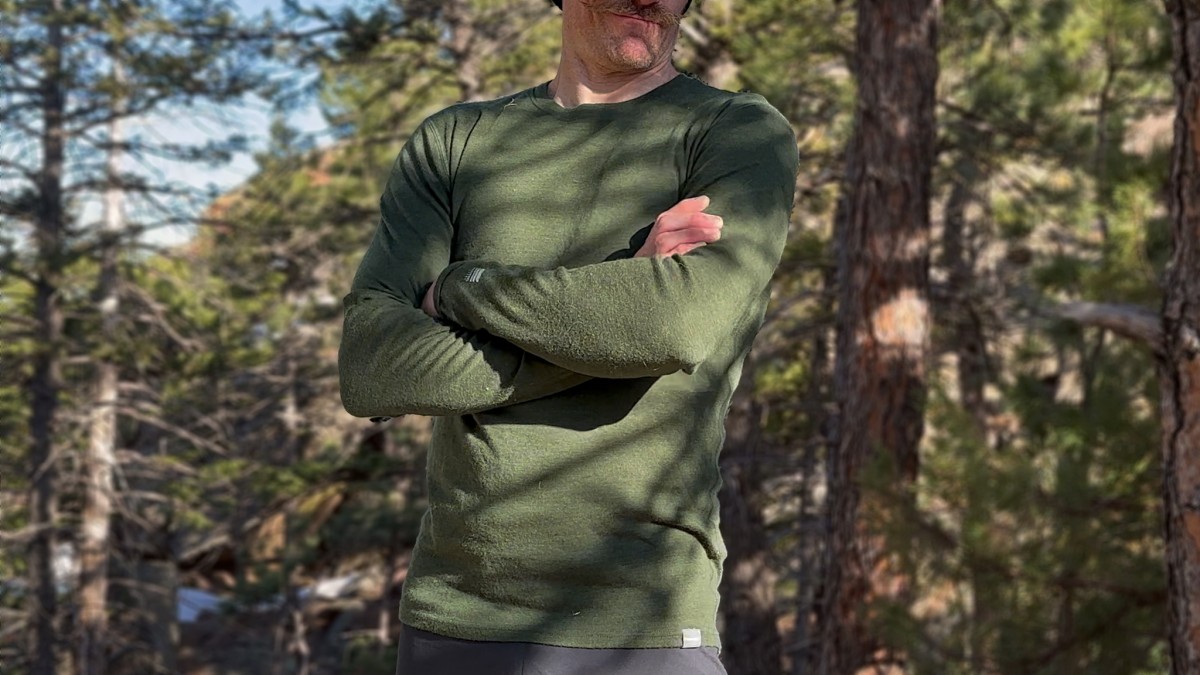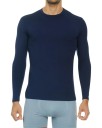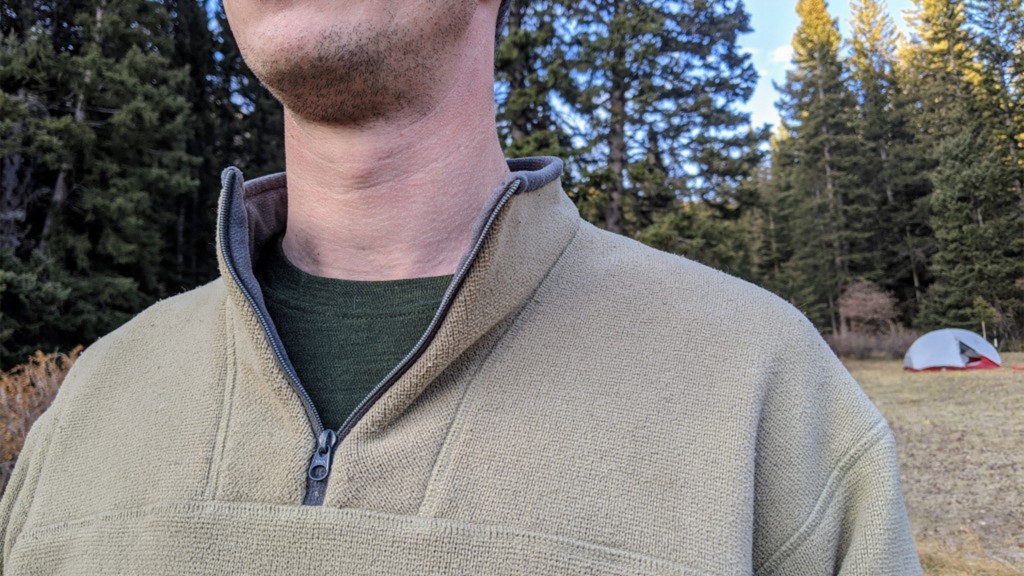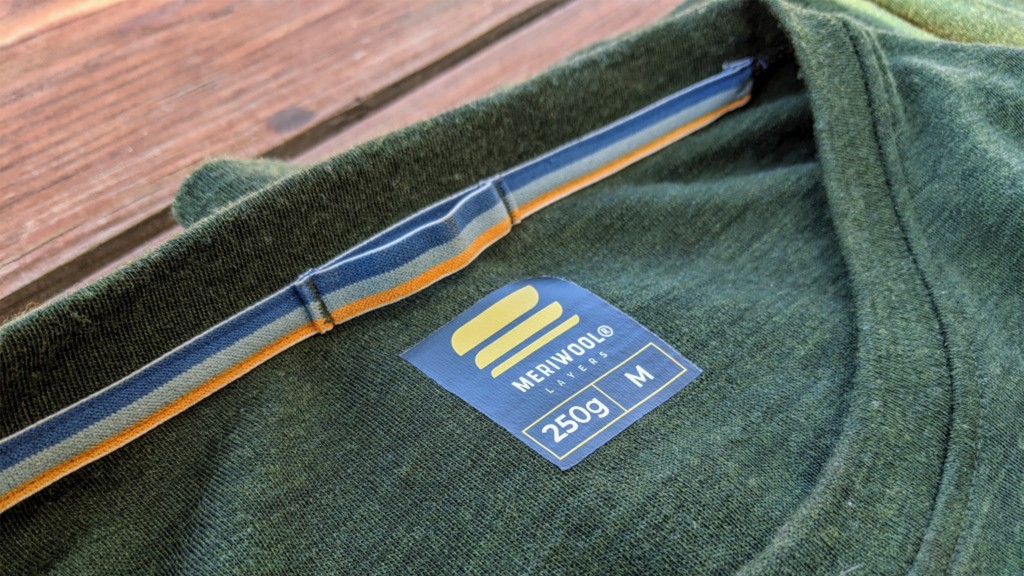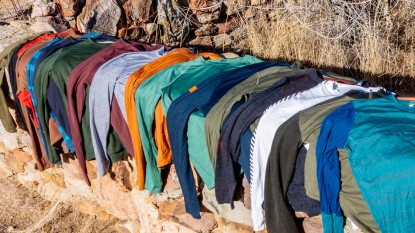Our Verdict
Compare to Similar Products
 This Product
Meriwool Merino 250 Long Sleeve | |||||
|---|---|---|---|---|---|
| Awards | Best Value for Merino | Best Synthetic Bang for Your Buck | |||
| Price | $60 List $59.99 at Amazon | $60 List $59.95 at REI | $40.00 at Backcountry | $40 List $27.93 at REI | $25 List $16.99 at Amazon |
Overall Score  |
|||||
| Star Rating | |||||
| Bottom Line | A fine Merino base layer at an entry-level pricepoint | Reach for this base layer when the temperature drops to wear underneath your jacket | This top is an impressively breathable and lightweight base layer built for activities where you are creating a lot of heat | A simple, functional base layer with performance issues consistent with the price point | Inexpensive though it is, we question if these base layers add enough value for us to suggest purchasing for all but the most cost-conscious, compression-seeking consumer |
| Rating Categories | Meriwool Merino 250... | REI Co-op Midweight... | Helly Hansen Lifa S... | REI Co-op Lightweig... | Thermajohn Long Sle... |
| Warmth (25%) | |||||
| Breathability (20%) | |||||
| Comfort and Fit (20%) | |||||
| Durability (15%) | |||||
| Drying Speed (10%) | |||||
| Layering Ability (10%) | |||||
| Specs | Meriwool Merino 250... | REI Co-op Midweight... | Helly Hansen Lifa S... | REI Co-op Lightweig... | Thermajohn Long Sle... |
| Measured Weight (Size Large) | 8.6 oz | 10.0 oz | 5.2 oz | 7.1 oz | 6.7 oz |
| Measured Shirt Length (Size Large) | 30 in | 29 in | 27 in | 29 in | 27 in |
| Material | RWS Merino wool | 92% recycled polyester / 8% spandex | 100% Lifa Dry | 92% polyester, 8% spandex | 92% polyester / 8% spandex |
| Fabric Weight Class | Midweight | Midweight | Lightweight | Midweight | Lightweight |
| Fit | Slim fit | Semi-fitted | Slim fit | Semi-fitted | Slim fit |
| Thumb Loops | No | Yes | No | No | No |
| Air Dry Test | 65 min | 55 min | 45 min | 45 min | 42 min |
| Dryer Safe | Not stated | Yes, tumble dry low | Yes | Yes | Yes, tumble dry low |
| Odor Control Fabric | Naturally odor resistant | None | None | None | None |
| UPF Sun Protection | 50+ | 50 | None listed | 50+ | None listed |
| Seam Stitching | Flatlock seams | Flatlock seams | Flatlock seams | Flatlock seams | Flatlock and overlock seams |
| Shoulder Top Seams | Yes | No | Yes | No | Yes |
| Drop Tail Hem | No | No | No | Yes | No |
| Available Cuts | Crew, 1/2 zip | Crew, 1/2 zip | Crew | Crew, short-sleeve, 1/2 zip, tall | Crew, long-sleeve V-neck |
Our Analysis and Test Results
As a relative newcomer to the Merino scene, Meriwool produces high-quality base layers at an affordable price point that stands in direct contrast to much of the marketplace. The Meriwool Merino 250 is a competitive 100% Merino base layer with a midweight-standard fabric weight of 250 g/m².
Performance Comparison
Warmth
As soon as we lifted it from the box, we knew that this was a base layer able to stand up to even the best of the competition. Although the 250 g/m² fabric weight puts the Merino 250 at the top-end of our midweight selection, actually wearing this top suggests otherwise. It is curiously more lightweight than other, similar tops, making it more adept at thermoregulation than most. Even on warm fall trail runs with lots of vertical gain, we never felt overheated while wearing this as a single layer. And as the seasons transitioned, we had no issues waking up and walking through frosty fields while backpacking in the alpine.
Despite the relatively similar fabric weight to other tops we tested, it does seem that the extra-fine Merino chosen to knit this layer makes a difference when it comes to warmth. It is not as warm as its direct competitors — we were noticeably colder, particularly when wearing this layer as a standalone top. For shoulder-season activity and into the winter, this is a great option. But don't be surprised if it comes up a bit short on the coldest days in the deep of winter.
Breathability
Where this top falls a bit short in terms of overall warmth, it picks back up when it comes to thermoregulation thanks to impressive breathability. Merino wool is known for its incredible moisture-wicking ability and the efficiency with which the fabric passes sweat from the inside to the outside for evaporation. The extra-fine Merino yarns chosen for the weave of the Meriwool Merino 250 only improve that efficiency. For intense training sessions in cool-to-cold weather, this base layer pairs effectively with a lightweight shell, like a windbreaker.
For a layer with a density of 250 g/m², we must admit this layer performs much more similarly to those midweight base layers on the lighter end of the spectrum at around 200 g/m². As breathability tends to trend oppositely to warmth, it is no surprise that the small tradeoff the Meriwool makes in terms of warmth, it gains back in breathability. If you plan to be working hard — whether it's skinning uphill or chopping wood — this top is an excellent alternative to thicker baselayers we tested at the same or similar fabric weight.
Comfort and Fit
Plush, but not too thick; soft, but not too delicate; the Meriwool Merino 250 seems to find that Goldilocks zone of comfort. Although we admit that the finer wool threads were a bit itchy at first, they quickly began to soften through regular wearing and washing.
Flatlock seams across the majority of this top (with the exception of the hem) ensure that the seams won't rub when worn next to the skin. In the future, we hope that Meriwool updates this otherwise well-designed piece with off-the-shoulder seams. But this slight criticism was only noticeable under the weight of a heavy backpacking pack.
This top has a slim, athletic, and yet stylish fit that is as suited to a day on the mountain as heading into town. It appears to fit very true to size — a size Large perfectly suited the 5'11", 185lb, athletic frame of our head tester. We particularly appreciate that the well-cut arms end in cuffs that are supported by a slight elastic band. Unlike other tops in this review, the cuffs maintained their true shape longer, even when we continued to pull them up over our forearms.
Drying Speed
As we have noted a few times already, what makes the Merino 250 a standout among otherwise very similar, midweight options is the extra-fine spun Merino wool. As with increased breathability, this also translates to slightly faster drying times. Although it is not nearly as quick-drying as the lightweight summer models we tested, there is a noticeable difference compared to its direct competition.
Indeed, the laboratory results from our soak n' dry test translated to what we experienced in the field while wearing this top as a base layer. Moisture was quickly wicked up and efficiently evaporated, keeping us dry and comfortable even through intense activity. The only exception to this was when backpacking — but without a suspended frame backpack, is it even a reasonable assumption to end the day without a sweaty back?
Durability
We had some initial doubts about the durability of this layer, again based on the underlying difference of the extra-fine spun Merino wool. As a natural fiber, Merino is not normally categorized as one of the more durable options for athletic attire. But through years of field testing wear-and-tear, we are coming around to a sense that this is more of a generalization.
Like other Merino tops tested, after our overly-aggressive abrasion test, the Meriwool showed some notable rips and tears. In the real world, some lumps and bumps were accrued mountain biking in this top. That said, thanks to flatlock seams backing up the high-quality construction of this layer, it is more likely to meet an early fate through improper washing and drying than it is through outdoor activity — as long as you keep the rubber side down and don't manage to land upside down into a tree.
Layering Ability
As an athletically cut base layer, the Merino 250 layers well with most mid-layers we tried. From sweaters to lightweight puffy's, this slim fit top allows for a comfortable range of motion in every circumstance, making it both versatile and practical. The fine Merino wool may catch on the scratchiest of mid-layers or tough canvas jackets. Although it doesn't involve layering directly, we received more than one compliment when wearing this top.
Since this top is designed first and foremost as a base layer, we certainly did not knock it too much for its inability to have layers beneath it comfortably. We simply found that even while wearing a t-shirt, the upper arms become way too tight, verging on the point of restricting some particular movements. This isn't a problem specific to the Meriwool, but we tested other similarly weighted tops that were cut a bit looser and didn't present this problem.
Should You Buy the Meriwool Merino 250 Long Sleeve?
For the price of entry, this layer is truly exceptional: a quality, 100% Merino wool base layer at a fraction of the cost of every other Merino layer we tested and researched. We were happy and a little surprised to report that this top's performance exceeds its price tag, offering great value and more affordable thermoregulation. Other tops may have more performance-driven features, but this top keeps things simple to deliver you a quality and reasonably priced product. If you're looking to experience for yourself just why Merino products are hyped as must-haves when it comes to technical base layers, the Meriwool Merino 250 is an excellent choice to seriously consider.
What Other Base Layers Should You Consider?
If the warmth of the Meriwool is what's most appealing to you and you're looking to level up your warmth game in comfort and fit especially, you can't go wrong with either the Smartwool Classic Thermal Merino 1/4 Zip or the Ortovox 185 Rock'N'Wool Long-Sleeve Compared to the Meriwool, the price difference for either of these phenomenal tops is not insignificant, especially if you're just getting cozy with the Meriwool's affordability. If your budget doesn't budge that much, consider a slightly lighter base layer like the REI Co-op Merino 185 Long-Sleeve Half-Zip, an extremely well-crafted base layer that'll last you many seasons of use. If the durability of a wool base layer in general is a concern, the synthetic Under Armour ColdGear Base 4.0 Crew is a warm base layer that can take a lot more abuse than any other thermal base layer we've tested.


